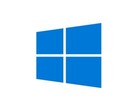Microsoft has struggled to capture any kind of smartphone market share since the inception of Windows Mobile. The latest iteration of the Redmond giant’s mobile operating system, Windows 10 Mobile, has only seen market share shrink and may be on its last legs. According to a report from Windows Central, Microsoft may be moving to shutter Windows 10 Mobile and migrate Windows to a unified desktop and mobile experience.
This thought is largely based on two key elements. Firstly, Microsoft recently announced plans to develop a version of Windows 10 that could run on ARM processors, which is the main architecture found in almost every smartphone CPU. Secondly, citing inside sources, Zac Bowden at Windows Central wrote today that Windows Mobile 10 has been moved to Microsoft’s “feature2” development branch, separating the mobile OS from its desktop counterpart, Windows 10.
Both the desktop and mobile version of Windows 10 are largely based on the same core development, and in the past, when Microsoft released an update to the desktop OS, an update to Windows 10 Mobile would come soon after. However, if sources are to be believed, Microsoft is beginning to delineate development between the two operating systems. By moving Windows 10 Mobile to the feature2 branch (which is based on the Windows 10 Redmond 2 update), Microsoft can continue to support the OS while focusing future development solely on the desktop version.
Keep in mind that this doesn’t mean Windows 10 Mobile is dead. On the contrary, Bowden wrote that Microsoft “may continue to service Windows 10 Mobile with security updates through 2018.” On top of that, this move could enable Microsoft to refresh the ailing Windows Mobile operating system schema and unify the two versions of Windows into a coherent experience with concurrent development and feature sets.
There is some bad news for current Windows Phone users, however; a unified OS (code-named “Andromeda,” according to rumors) would not be compatible with legacy hardware. As such, current Windows-based smartphones could not be updated to any version of the unified OS. However, this could consolidate Microsoft’s efforts in the mobile space with that of its much more successful desktop business. Time will tell what will become of Windows Mobile, but suffice it to say that the underdog OS is likely not long for this world.


 Deutsch
Deutsch English
English Español
Español Français
Français Italiano
Italiano Nederlands
Nederlands Polski
Polski Português
Português Русский
Русский Türkçe
Türkçe Svenska
Svenska Chinese
Chinese Magyar
Magyar









